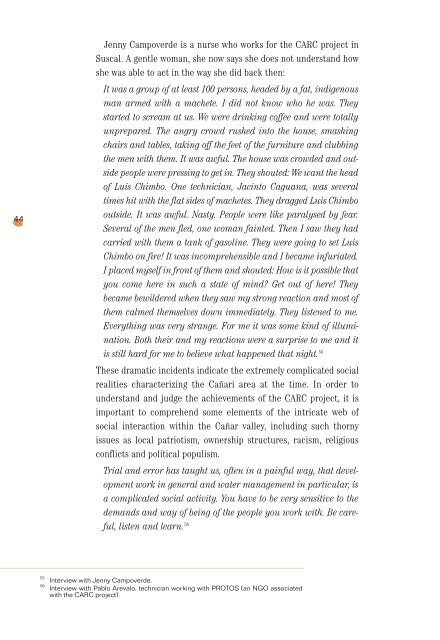mishqui-yacu, sweet water - IFAD
mishqui-yacu, sweet water - IFAD
mishqui-yacu, sweet water - IFAD
Create successful ePaper yourself
Turn your PDF publications into a flip-book with our unique Google optimized e-Paper software.
44<br />
Jenny Campoverde is a nurse who works for the CARC project in<br />
Suscal. A gentle woman, she now says she does not understand how<br />
she was able to act in the way she did back then:<br />
It was a group of at least 100 persons, headed by a fat, indigenous<br />
man armed with a machete. I did not know who he was. They<br />
started to scream at us. We were drinking coffee and were totally<br />
unprepared. The angry crowd rushed into the house, smashing<br />
chairs and tables, taking off the feet of the furniture and clubbing<br />
the men with them. It was awful. The house was crowded and outside<br />
people were pressing to get in. They shouted: We want the head<br />
of Luis Chimbo. One technician, Jacinto Caguana, was several<br />
times hit with the flat sides of machetes. They dragged Luis Chimbo<br />
outside. It was awful. Nasty. People were like paralysed by fear.<br />
Several of the men fled, one woman fainted. Then I saw they had<br />
carried with them a tank of gasoline. They were going to set Luis<br />
Chimbo on fire! It was incomprehensible and I became infuriated.<br />
I placed myself in front of them and shouted: How is it possible that<br />
you come here in such a state of mind? Get out of here! They<br />
became bewildered when they saw my strong reaction and most of<br />
them calmed themselves down immediately. They listened to me.<br />
Everything was very strange. For me it was some kind of illumination.<br />
Both their and my reactions were a surprise to me and it<br />
is still hard for me to believe what happened that night. 55<br />
These dramatic incidents indicate the extremely complicated social<br />
realities characterizing the Cañari area at the time. In order to<br />
understand and judge the achievements of the CARC project, it is<br />
important to comprehend some elements of the intricate web of<br />
social interaction within the Cañar valley, including such thorny<br />
issues as local patriotism, ownership structures, racism, religious<br />
conflicts and political populism.<br />
Trial and error has taught us, often in a painful way, that development<br />
work in general and <strong>water</strong> management in particular, is<br />
a complicated social activity. You have to be very sensitive to the<br />
demands and way of being of the people you work with. Be careful,<br />
listen and learn. 56<br />
55<br />
56<br />
Interview with Jenny Campoverde.<br />
Interview with Pablo Arevalo, technician working with PROTOS (an NGO associated<br />
with the CARC project).
















